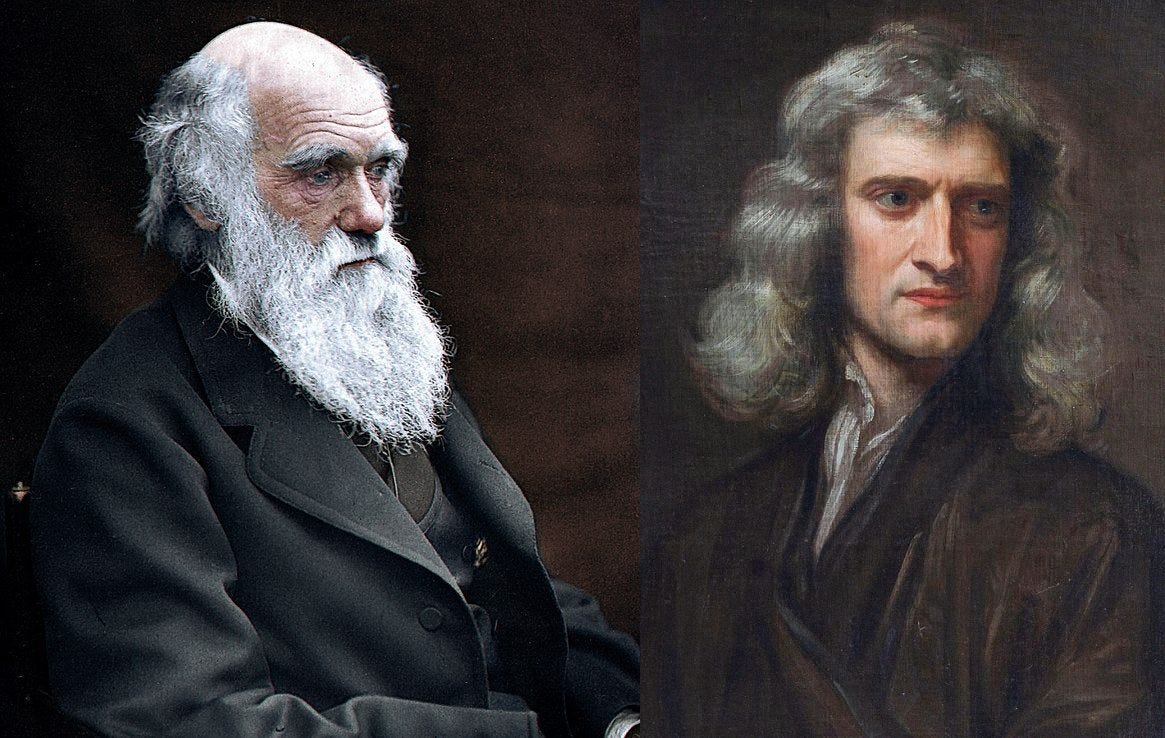A Skeptical Journalist Interviews Frank Calloway, Part 2
Leaps of Faith, Peppered Moths, and Occam's Razor
Charles Darwin and Isaac Newton
Part 1 of this series is here.To get you up to speed, at the end of part 1 of this series, Frank Calloway was asked why he believes in creation rather than the “scientifically proven” theory of evolution.
“That is a valid question, Shoogie,” Frank answered. “Admittedly, both belief in creation and belief in evolution require a leap of faith.”
“What do you mean by a ‘leap of faith’?” I asked.
“No human was around to see either event take place,” Frank answered. “There are no eyewitnesses on earth of Adam and Eve being created; there are no photographs, or even cave paintings, of the event. On the other hand, nobody has seen — or is currently seeing — evolution taking place, either. If evolution produces something better (which it would have to, as otherwise it would be devolution — and we humans are obviously not perfect, based on what we observe happening in the world around us), we should still be evolving, to adapt to changed societal circumstances by improving ourselves and how we interact with others. And no animals are observed changing into different species, either, not even into related species — for example, house cats are not evolving into Tigers, Chihuahuas are not morphing into Grey Wolves, nor are …”
“Hold on a minute, Frank! Animals have changed over time to better adapt to their environs.”
“Have they changed into other species, Shoogie, or have circumstances allowed certain members of a given species best suited for their environment to survive and procreate, while other members of the same species have died out? In other words, is it the case that the individuals in the species with favorable traits are the ones that have survived to produce offspring similar to themselves (with larger or stronger beaks, or darker coloration, or longer necks, or what have you), whereas those with traits less suitable to surviving in their locale died off?”
“What are you talking about, exactly?”
“Well, for example, when there were white and black peppered moths in the coal-producing regions of Britain, the predominantly white ones, being more easily seen against the coal-blackened trees and other surfaces in the area, were the ones being eaten by birds, leaving the camouflaged mostly black ones alive and able to reproduce. Was that a case of the white moths evolving into black ones, or was it rather a case of the black ones surviving and producing offspring in their (darker) image, whereas the white ones were no longer alive to produce white offspring?”
I responded, “I don’t know, Frank, but I still say evolution is a proven fact, and is accepted by all respected scientists.”
“It is true that many, and probably even the majority of scientists accept evolution, Shoogie, but by no means do all of them. Take the renowned Isaac Newton, for instance. And again: why is it that some people, including scientists, choose to believe in evolution? Is it because there is incontrovertible proof for it, or is it because they, like most people, tend to believe what they want to believe?”
“Why would someone want to believe evolution if it were illogical or unproven, as you say it is, Frank?” I asked.
“Perhaps because that leaves them — in their minds, anyway — as unbeholden and unaccountable. If they evolved, they can view themselves as the smartest beings in the universe — with no Almighty Creator to usurp that position of primacy from them. They don’t want to feel indebted to anybody — not even to God! It could be that the desire to be a law unto themselves, to be completely independent, is what moves some to reject the notion of a creator.”
“Then what about those who believe in creation, Frank? You admitted that it requires a leap of faith to do so, and that people believe what they want to believe. Aren’t you just as gullible for believing in creation?”
“I acknowledge that it requires a measure of faith to believe in creation, just as believing in evolution requires such. The question is, in what or in whom do you choose to put faith: In God or in man? Who likely has a better motive in making the leap of faith requisite in either case: those who consider themselves to be the apex of all forms of life, or those who willingly recognize that they are inferior and acknowledge their indebtedness to an omniscient and omnipotent Creator?
“The leap of faith required to believe in a Creator can be compared to a bound across a stream; the leap of faith necessary to swallow the theory of evolution is more like trying to hurdle the Snake River without a steam-powered rocket (Evel Knievel didn’t even make it across that vast expanse with the rocket).”
“That’s preposterous, Frank!,” I contended. “Belief in a miraculous creation is easier to buy than accepting the proof that we evolved?!?”
“You keep saying evolution has been proven, Shoogie. It hasn’t. That’s why it’s referred to as the theory of evolution. You can theorize about anything. It has even been said that everything works … in theory. If not for the psychological reasons some have for doing so, it would actually be mind-boggling to me that anybody believed in evolution at all.”
“Mind-boggling? Compared to the belief that a supreme being created everything?”
“Yes; I mean, think of it: for giraffes to evolve a long neck (for instance) so that they could eat the leaves in the trees that other animals can’t reach (which at least some evolutionists claim they did), they would have to survive an awfully long time with the disadvantage of having a shorter neck. Their necks aren’t going to elongate in some Pinochio-esque fashion overnight, so to speak. It would take centuries, or at least decades — several generations, anyway — for them to transform from having short necks to long ones. And if that were the case (that such a change occurred over the span of just a few generations), they obviously survived with shorter necks all that time, so was there really a need for longer necks? And what about the competitors for the leaves of those acacia, mimosa, and wild apricot trees that giraffes like to eat — why wouldn’t those competitors for the food also evolve longer necks in a sort of savannah neck race?
“Perhaps over time something similar happened with the giraffes as did with the pepper moths, as longer necks were preferable to the relatively shorter ones, just as for the pepper moths a darker coloration was preferable over lighter (in that time and place); but that’s not evolution, any more than successive generations in a family being taller because of improved diet or intermarrying with especially tall people is evidence of such. The giraffes are still giraffes, albeit perhaps with longer necks, and the humans are still humans, even if they are a bit taller than their grandparents were.
“That’s just one example. Think also of the fact that for procreation to take place, there must be two members of the same species living at the same time and in the same place, one male and one female, in order to produce offspring and perpetuate the species. What are the odds of that happening by means of evolution? And for all the different species? Creation solves the puzzle, though.
“Besides all of that, think of the exquisite design we see in everything around us. How is it that the earth just happens to be in exactly the right location — being the perfect distance from the sun — to sustain life? And that the angle of its tilt is precisely what it needs to be; and that its rotational speed is exactly right, and so forth? Moreover, that’s just scratching the surface — What about the intricate design of all sorts of things in the world around us? How did that come to be? A design requires a designer. You can’t just throw paint on a ceiling and expect a detailed map of the Paris metro system to appear there by chance.”
“What do you mean by design, Frank? All animals have basic characteristics in common: they all have heads with eyes, ears, noses, and throats. All have arms and legs and bellies and such. It seems everything in existence is just variations on a general theme, adaptations from some common starting point.”
I thought I had him there, but his response to that was:
“That commonality could be considered proof that they were designed by the same brain — the same cosmic artist, you might say. As for design in what we see around us, consider these things, just to mention a handful: photosynthesis, the body’s ability to heal wounds, our sense of taste, our innate response to beauty and music, elephant trunks, sea otter fur, cat tongues and whiskers, the echolocation of bats, the dolphins’ sonar, shark skin (literal shark skin, that is), … shall I go on? It is all so complex and perfectly designed — how could it all arise by mere chance? The odds of random happenstance producing these things is beyond astronomical.”
“All of those things could have evolved — and did! So say the scientists, who are smarter than you and I are!” I countered.
“What about Isaac Newton?”
“Okay, then, most scientists.”
“Don’t sell yourself short, Shoogie; if something seems irrational, why believe it just because others do? If something is incomprehensible, maybe it’s because it’s simply not logical. It’s good to be open-minded, but not so much so that your brains fall out. Some people believe things just because someone they consider intelligent told them it was so. Then they pass it on to the next generation and it is, again, blindly accepted as unassailable truth. You know, it’s okay to use your own brain and break the cycle of passed-on nonsense. Remember Occam’s Razor.”
I did, but I tried to make a bit of a joke out of it by replying, “Occam’s Razor? I remember Gillette’s razors, and Schick’s razors.”
Frank didn’t realize I was pulling his leg. He played it straight and said: “That’s a different kind of razor altogether. Occam’s Razor is, in a nutshell, the principle that when there are two competing ideas on a matter, the simpler one is the one you should usually opt for, as it is probably the correct one. And which is simpler: the super-convoluted belief that everything somehow came about by chance, all at the right time and place even though there are myriad interconnecting independencies and instances of symbiosis, or that an omniscient and omnipotent being very deliberately designed and created it all?”
“My head is spinning, Frank,” I admitted. “I’ll have to think about this on my own, later. But that’s enough on that topic for now. There are other things I wanted to ask you about. For instance: Why is it that you Jehovah’s Witnesses continue to bother people with your door-knocking and evangelizing?”
— to be continued.






